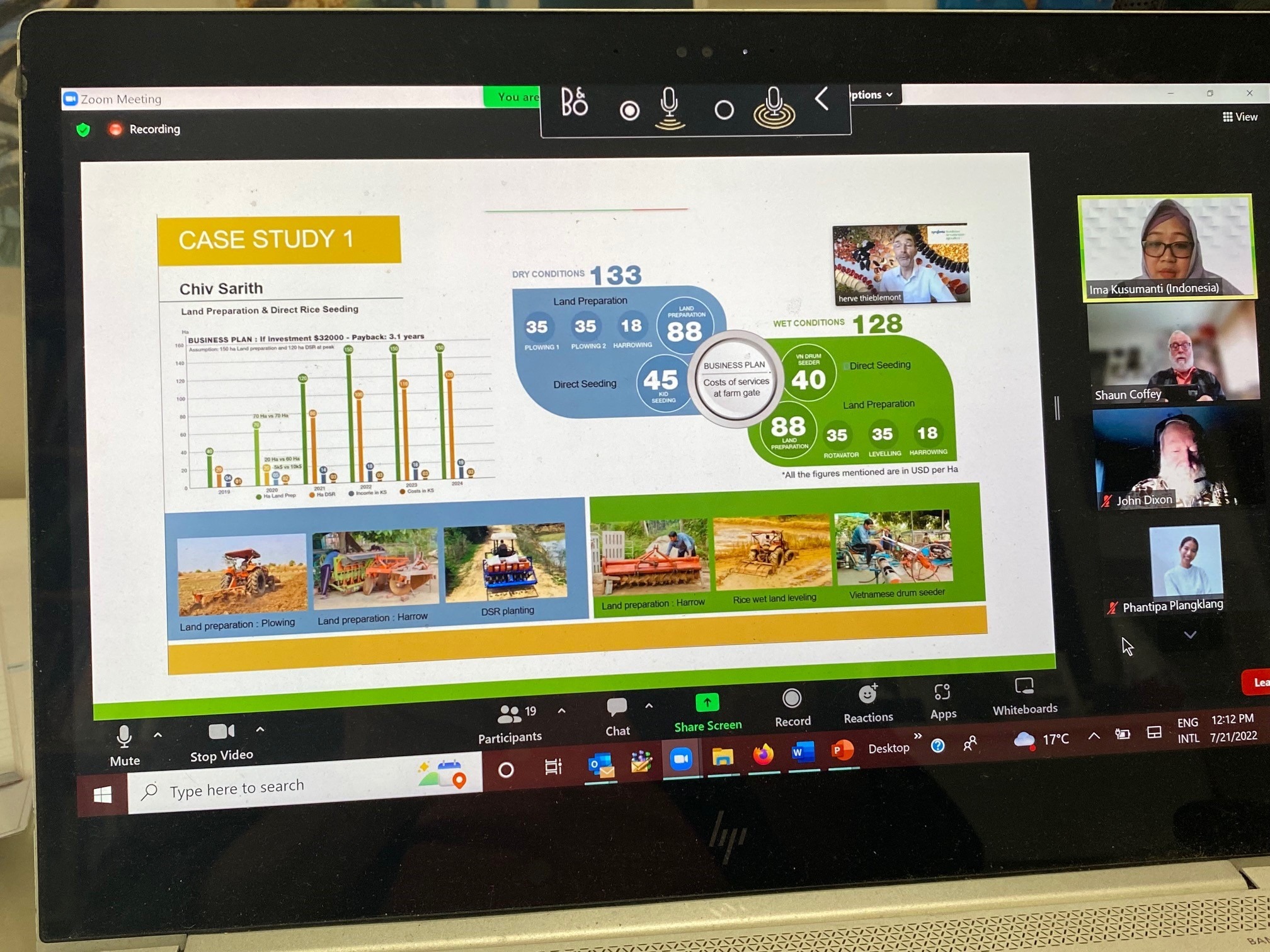

Sustainable Intensification of Agri-Food Systems in South-East Asia – 11 July to 8 August 2022
July 26, 2022

The Crawford Fund commenced delivery of the second of a series of Master Classes on Sustainable Intensification (MC SI) on July 11. Building on a successful program run in South Asia in May, the second class is being run for participants from South-East Asia and attended by 26 early to mid-career participants from research, development, extension, strategy and policy making from Government, agencies and universities in Cambodia, Indonesia, Myanmar, the Philippines, Thailand and Vietnam. Prof Shaun Coffey, our Director of Capacity Building, has provided this report:
The MC SI for South-East Asia has a focus on the two major farming and food production zones of the region, viz, the lowland rice mixed farming and food system and the predominantly rainfed hill mixed farming and food system which both extend across most countries in the region. Dr John Dixon, who has over 30 years of developing country experience with agricultural research and development, is leading the Master Class. Many key figures in the Crawford, including board member Prof Tim Reeves and Crawford Fund Medal Awardee Robyn Alders, are joining John and I and providing valuable input.
The program is organised in four stages:
Stage 1: SI purpose, principles and practices (completed)
Stage 2: Backcasting from the achievement of SDGs (completed)
Stage 3: SI emerging technological and institutions innovations (in progress)
Stage 4: Mainstreaming SI: programs and developing roadmaps (early August delivery)
The planned outputs are enhanced understanding and competencies of participants of sustainable intensification – rationale, design, policy settings, selected emerging practices, assessment, management of implementation – spanning research and scaling/development. In the process, one or more outlines of programs and roadmaps for mainstreaming SI will be developed. Expected outcomes are better designed and implemented SI proposals, projects and programs in the regions.
The Master Class is designed as a facilitated co-learning process with emphasis on focused discussion in plenary and in breakout groups, supported by numerous pre-recorded mini-presentations – including some from participants in their areas of expertise and experience. There will be opportunities for complementation of individual and group tasks during the sessions, and in between sessions. Participants will have an opportunity to provide feedback on the Master Class content during the Master Class, and to evaluate the Master Class at its conclusion. Certificates of completion will be awarded.

The rationale for these Master Classes is compelling.
Fifty years of expanding food production has successfully met growing aggregate demand. However, depletion and degradation of the natural resource base for agriculture adds to the future challenges of providing food, fibre and ecosystem services for sustainable development and planetary health to 2030 and 2050. Thus, many scientists and policy makers emphasise the need for sustainable agricultural intensification (SI) focused on the twin agricultural outcomes of improved natural resource and increased productivity.
The term ‘agriculture’ encompasses crops, trees, livestock and fish, as used by the Food & Agriculture Organization. The global crises of climate, food and nutrition insecurity and poverty – and increasing food prices — add urgency to the effective application and scaling of SI. The breadth and flexibility of the SI approach facilitates its adaptation to different ecologies and countries. In fact, the successful adaptation of SI to local contexts (agroecological, farming systems and socio-institutional) has been well documented, but implementation and scaling of SI has lagged behind expectations.
Many countries lack adequate capacity and trained professionals for the effective design, implementation and monitoring of SI programs and roadmaps, especially in the broad agri-food system sense described in the preceding paragraph. In the circumstances, SI research and development proposals have not attracted sufficient national and international priority and funding, and SI programs have failed to deliver their full potential.
In most countries and regions, SI training can build on existing agri-food development expertise. Increased domestic capacity in SI will not only secure future nutritious food supply but also contribute to the achievement of national goals and the SDGs. The Crawford Fund has long experience in the development and delivery of master classes for the advanced capacity building in the Indo-Pacific Region, with the ability to tap into regional, Australian and international expertise.
The Crawford Fund Approach
We recognise that the major global challenge we face is achievement of the Sustainable Development Goal, while producing more and better-quality food using fewer resources and improving ecological service and land condition.
There are many competing “philosophic” schools of thought about how to achieve SI, for example, Organic Agriculture, Regenerative Agriculture, Agroecology, Climate Smart Agriculture, Conservation Agriculture.
These all offer important pathways to sustainable food production – but it is not helpful to get into debates about which is best. They all have strengths and limitations. How you achieve SI needs to be methodologically agnostic and we need practical actions that integrate the scientifically-sound processes from each and scaling these in all systems.
The Crawford Fund does not want to get involved in a debate about what is sustainable per se! How you achieve SI can be methodologically agnostic – regenerative processes, soil health improvement, conservation tillage, supplementary irrigation, reuse of solid and liquid wastes, organic and inorganic and there may be many different solutions for different environments. Common sense needs to prevail.
As Tim Reeves said during the Master Class, opportunities exist to enhance current food systems – with efficiency. For example
- Achieving more input-use efficient
- Using Less water
- Using less energy-rich inputs
- Generating less greenhouse gas emissions
- Increased emphasis on nutritional value of food, and
- Re-building soil C and N (not just replace)
Our Master Class program has a very full calendar of training coming up, both in person and online and we particularly appreciate the efforts of those who work with us to develop and facilitate what is the flagship training initiative of the Crawford Fund.




 0
0